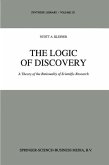Dieser Download kann aus rechtlichen Gründen nur mit Rechnungsadresse in A, B, BG, CY, CZ, D, DK, EW, E, FIN, F, GR, HR, H, IRL, I, LT, L, LR, M, NL, PL, P, R, S, SLO, SK ausgeliefert werden.
"This volume is full of such thought-provoking nuggets, and it will certainly make an enjoyable reading to philosophers, historians of philosophy, philosophers of science, historians of Islamic/Arabic culture, grammarians, belletrists, and certainly practicing scientists who wish to take a deep breath, away from their exhausting work at their laboratories, and stop to think of what they were doing." (George Saliba, Metascience, Vol. 21, 2012)
"This is an impressive contribution both to the history of science and to the history of philosophy... Even for those who are not working in the history of science or philosophy the book is immensely appealing. Just to give an example, I was struck by the link between lemmata and middle terms . I will start by studying the chapter on Self-awareness and knowing that one knows and move next to Avicenna's naturalized epistemology. The whole book is relevant to contemporary philosophical issues. The account of the notion of "tropos" is a case in point." Paul Gochet, Pôle de Logique, Université de Liege, Belgium









